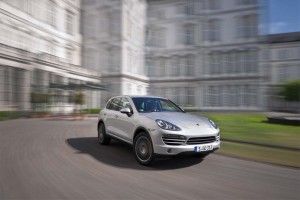Diesels have accounted for as much as half of the European new car market in recent years, but that number could plunge in the near future if the French government takes step to phase out the high-mileage powertrain option.
That’s a very real possibility, Prime Minister Manuel Valls now saying past support for diesel power was a “mistake,” and calling for a gradual phase-out in favor of less polluting technologies.
“In France, we have long favored the diesel engine,” the Prime Minister said on Friday. “This was a mistake, and we will progressively undo that, intelligently and pragmatically.”
Whether that call will resonate remains to be seen, especially considering a full 80% of the vehicles on French roads currently are powered by diesel engines.
Oil-burners have been popular in much of Europe over the past decade, in part due to their higher mileage, but also because of supportive taxation policies that make diesel fuel much less expensive than gasoline in much of the European Union.
Currently, a liter of diesel goes for 1.167 Euros in France, or $1.46. A liter of regular unleaded is priced at 1.390 Euros, or $1.73. (On a per-gallon basis, the gap works out to $5.53 for diesel, compared to $6.55 for gasoline.)
(Ram 1500 EcoDiesel named Green Truck of the Year. Click Here for the full story.)
But France plans to raise the excise tax on diesel by 2 euro cents a liter next year – which it estimates will generate more than 800 million in revenues. Further increases would be likely if the Prime Minister’s recommendation is picked up by lawmakers.
Meanwhile, the country is also dangling a carrot in front of diesel owners, offering them incentives of up 10,000 Euros, or $13,500, to trade their vehicles in for electric models.
Ironically, the turn in direction by the French government occurs just as U.S. motorists have begun to re-embrace diesels after a long lag. Sales are expected to reach new highs in the U.S. this year as more advanced “clean diesel” technologies help overcome prior problems such as smoke, noise and rattling.
(Paris Motor Show challenged automakers to see how low they could go with emissions, fuel consumption. Click Herefor more.)
Despite the sharp reduction in emissions of smog-causing oxides of nitrogen and particulates, critics contend that modern diesels still are not clean enough. They point, in particular, to ongoing studies that suggest even the small amount of particulates these engines produce could be linked to lung cancers and other ailments.
Going forward, the French government plans to launch a car identification program that will rank vehicles based on the amount of pollution they produce. In turn, local regulators could use that ranking system to limit urban access for dirtier vehicles.
Paris is one of many cities that has considered placing limits on the most offending vehicles. That could come in the form of a London-style congestion tax, or perhaps an outright ban.
How long it would take to effectively phase out diesels from the French market is something officials have not yet outlined. And it could depend on public response to the PM’s plans – as well as resistance automakers might offer. On the other hand, with both French carmakers, especially Renault, trying to take a lead in electrification, the plan just might have a chance of success.
(Nissan planning to debut new diesel Titan pickup at 2015 Detroit Auto Show. Click Here for more.)


It’s pretty obvious how clueless some politicians are. How the French government reached the conclusion that Diesel’s are “bad” but other engine types are OK, defies explanation. I’m sure there is a lot more to the story than meets the eye and the French citizens may revolt – as they should. Only a technically illiterate individual would deem current EVs as viable for more then 1% of the world.
EV’s don’t even have a supporting infrastructure but tax payers are being charged for the pipedreams of the clueless with bogus tax incentives, no road tax paid by EV operators, charging stations, etc.
If EV’s were practical then the utility companies would be building recharging systems all over the place and charging people to recharge their EV batteries just as the oil companies built gas stations to supply fuel for internal combustion engine powered vehicles. I think OPEC can confirm it’s worked out pretty well for them…
Tax payers didn’t pay for fuel filling stations and they should not be paying for EV charging stations.
Plug-in hybrids will solve the EV problems you describe.